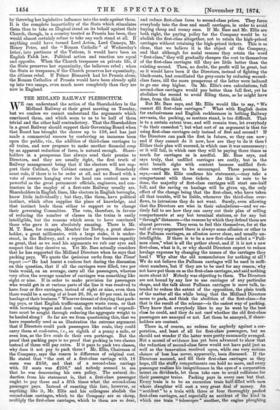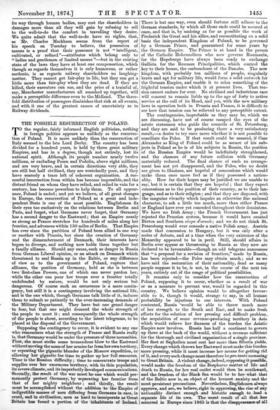THE MIDLAND RAILWAY PLEBISCITIIM.
WEcan understand the action of the Shareholders in the Midland Railway at their great meeting on Tuesday, but we confess we cannot understand the arguments which convinced them, and which seem to us to be half of them trivial and the other half contradictory. That the Shareholders in a great Railway should support their Governing Board when that Board has brought the shares up to 138, and has just made a commercial success by conferring an immense boon upon the public, viz., the addition of third-class carriages to all trains, and now proposes to make another financial coup by an apparent reduction of fares, is natural enough. Share- holders in a prosperous line always send their proxies to Directors, and they are usually right, the first truth of Railway management being that if the electors will not sup- port their Cabinet, the Cabinet cannot govern. Somebody must rule, if there is to be order at all, and no Board with a vote of censure hanging over its head can control men so powerful as the great permanent officials, engineers, and con- tractors in the employ of a first-rate Railway usually are. Shareholders in English lines, like electors in English boroughs, know little individually ; but they, like them, have political instinct, which often supplies the place of knowledge, and that instinct leads them either to support or to change their governing Committee. The vote, therefore, in favour of reducing the number of classes in the trains is easily intelligible, but the reasons which seem to have convinced those who gave it are absolutely amazing. There is Mr. M. T. Bass, for example, Member for Derby, a great share- holder, a great millionaire, with a large stake, it is under- stood, in the Railway, and a reputation for business capacity so great, that as we read his arguments we rub our eyes and suspect that they deceive us. Yet Mr. Bass actually considers that he has supported the Midland Directors when he says that packing pays. We quote the ipsissima verba from the Times' report He had learnt a curious fact during the discussion on this question, that if all the carriages were filled, two per train would, on an average, carry all the passengers, whereas very often the average number of carriages was something like eight or nine. If in order to make provision for passengers who would get in at various parts of the line it was resolved to have four or five carriages, instead of eight or nine, even then there would be a saving of at least 20, 30, or 40 per cent, in the haulage of their business." Whoever dreamt of denying that pack- ing pays, or that English traffic-managers waste room, or that with increasing wages and dear coal, the reduction of expendi- ture must be sought through reducing the aggregate weight to be hauled along? So far are we from questioning this, that we have repeatedly used as an illustration the extreme argument that if Directors could pack passengers like coals, they could carry them at coal-rates, i.e., an eighth of a penny a mile, or even less, as the live coals do their own porterage. But the proof that packing pays is no proof that packing in two classes instead of three will pay extra. If it pays to pack two classes, why does it not pay to pack three ? Mr. Ms, Chairman of the Company, says the reason is difference of original cost. He stated that "the cost of a first-class carriage with 18 seats was £450, and that of a second-class carriage with 32 seats was £250," and nobody seemed to see that he was denouncing his own policy. The natural de- duction from his statement is, that a first-class passenger ought to pay three and a fifth times what the second-class passenger pays. Instead of exacting this fare, however, or anything like it, Mr. Ellis and his colleagues abolish the second-cla.ss carriages, which to the Company are so cheap, multiply the first-class carriages, which to them are so dear,
and reduce first-class fares to second-class prices. They force everybody into the dear and small carriages, in order to avoid buying cheap and roomy ones. If Mr. Bass and Mr. Ellis are both right, the paying policy for the Company would be to abolish the first-class altogether, not to retain the high-priced carriages without retaining the high-priced tickets. This is so clear, that we believe it is the object of the Company, and that although for social reasons they retain the word "first-class," they will gradually cheapen the cost to themselves of the first-class carriages till they are little better than the existing second. Then, no doubt, the profit will be great, but so it would have been if the Directors, instead of fighting the black-coats, had conciliated the grey-coats by reducing second- class fares, till the more prosperous of the latter were induced to go one step higher. On Mr. Ellis's own calculations, full second-class carriages would pay better than full first, yet he abolishes the second to avoid filling them, as he might have done, from the third.
But Mr. Bass says, and Mr. Ellis would like to say, "We cannot fill first-class carriages." What with English desire for exclusiveness and English recklessness in bribing Railway servants, the packing, as matters stand, is too difficult. That is to a certain extent true, and will remain true, let everybody "do their cussedest "; but what sort of an argument is that for using first-class carriages only instead of first and second? If the Directors can pack the first in future, so they can now ; and if they ..cannot do it now, how are they to do it then ? Either their plan will succeed, in which case it was unnecessary; or it will fail, in which ease they will be paying three times as much for carriages as is needful. Mr. Bass says, and says truly, that unfilled carriages are costly, but in the next breath sighs with content because unfilled first- class carriages are to be encouraged. Three persons, he says,—and Mr. Ellis confirms his statement,—may take a compartment with three tickets. As this is sure to be done, the majority of first-class carriages will start one-half full, and the saving on haulage will be given up, the only effect of the change being that the first-clase, who have taken all that trouble, will be liable, whenever the third-class over- flows, to intrusions they do not want. Surely, even allowing that the Directors are wise in their calculations—and we en- tirely fail to see how they can carry out their plan of selling compartments at any but terminal stations, or for any but "through" distances—the reasons by which they defend them are ahnost perverse. They, seem to feel this themselves, for at the tail of every argument there is always some allusion or other to the Pullman carriages, an allusion never clear, and usually un- intelligible. If there is to be a new first-class called a " Pull- man class," what is all the pother about, and if it is not a new first-class, what is it, or why should Directors expect to reduce haulage expenses by changing the names of the carriages they haul? Why alter the old nomenclature for nothing at all ? We do not believe the Pullman carriages will be used in suffi- cient numbers,-but if they are to be used for any reason; why not have put them on as the first-class carriages, and said nothing more about it? Nobody was objecting to them. The Directors are not bound by any law to use carriages of any particular shape, and the talk about Pullman carriages is mere talk, in- tended to reduce the extent of the opposition, the plain truth of the matter all the while being that the Midland Directors mean to pack, and think the abolition of the first-class—for that is the result of the scheme—is the easiest way of packing. They know that everybody likes to say he went by the best class he could, and they do not care whether the old first-class passengers are annoyed or not. Let them be annoyed, if share- holders are content.
There is, of course, no redress for anybody against a cor- poration, and least of all for first-class passengers, but we should not wonder if the latter were pretty summarily avenged. Not a morsel of evidence has yet been advanced to show that the reduction of second-class fares would not have paid just as well as the innovation resolved upon, while one very serious chance of loss has never, apparently, been discussed. If the Directors succeed, and fill their first-class carriages as they hope, till the stuffy compartments can hold no more, and every passenger realises his insignificance in the eyes of a corporation intent on dividends, let them take care to avoid collisions for their passenger trains. Packing pays in every case but that. Every train is to be an excursion train half-filled with men whose slaughter will cost a very great deal of money. An " accident " to a train with three or four thoroughly packed first-class carriages, and especially an accident of the kind in which one train " telescopes " another, the engine ploughing its way through human bodies, may cost the shareholders in damages more than all they will gain by refusing to sell to the well-to-do the comfort in travelling they desire. We quite admit that the well-to-do have no rights, that, as Mr. Charles Markham seems from the report of his speech on Tuesday to believe, the possession of means is a proof that their possessor is not "intelligent, cultivated, or refined "—attributes which belong only to "ladies and gentlemen of limited means "—but in the existing state of the laws they have at least one compensation, which though as regards themselves it is only humorous, or rather sardonic, is as regards railway shareholders no laughing- matter. They cannot get fair-play in life, but they can get a little more than fair-play when they are dead. If they are killed, their executors can sue, and the price of a trainful of, say, Manchester manufacturers all smashed up together, will make a perceptible difference even to the Midland. The three- fold distribution of passengers diminishes that risk at all events, and with it one of the greatest causes of uncertainty as to Railway dividends.



































 Previous page
Previous page